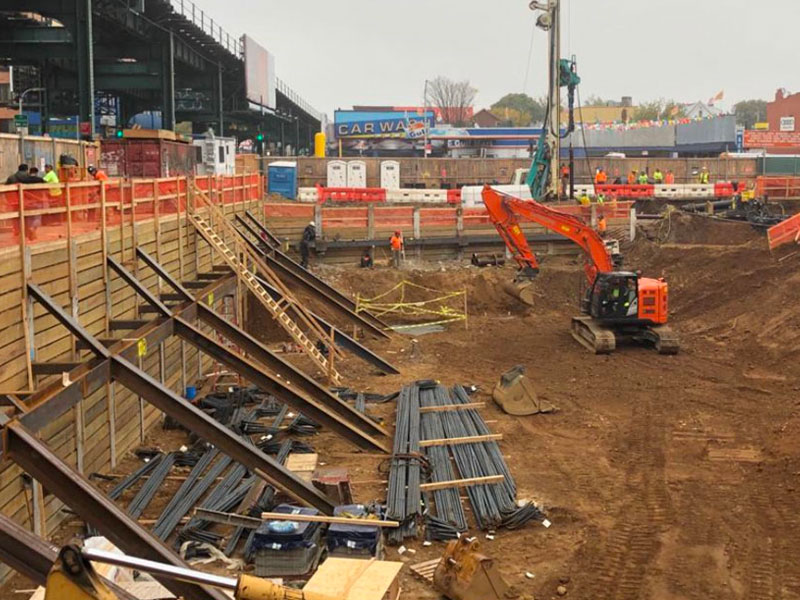Specialist Septic Ohio - Relied On Septic Tank Professionals in Ohio
Specialist Septic Ohio - Relied On Septic Tank Professionals in Ohio
Blog Article
Comprehensive Excavation Techniques: Mastering the Basics for Success
In the world of construction and civil engineering, the relevance of reliable excavation methods can not be overstated. The careful planning, accurate execution, and careful focus to detail needed in excavation jobs demand an extensive method that includes different fundamental aspects. From first dirt analysis to the implementation of precaution and routine progression tracking, mastering these core aspects is crucial for accomplishing success in any type of excavation endeavor. Nonetheless, the real proficiency lies not simply in understanding these principles but in flawlessly incorporating them to navigate the intricacies of excavation jobs with finesse.
Comprehending Excavation Task Planning

The first phase of any excavation project is the planning phase, where essential choices are made that can considerably impact the result of the project. Understanding the project scope, timeline, and budget restraints is crucial for developing a thorough excavation plan that makes sure the task's success.
One secret facet of excavation job preparation is the advancement of an in-depth timeline that describes the series of target dates, milestones, and activities. This timeline functions as a roadmap for the task team, enabling them to track progress and make necessary modifications to make sure the task remains on routine. Furthermore, a distinct spending plan that accounts for all expenses, consisting of equipment rental, labor costs, and products, is necessary for staying clear of price overruns and delays. By carefully thinking about all these aspects during the drawing board, excavation tasks can be executed successfully and successfully, causing effective outcomes.
Dirt Evaluation and Website Examination
Conducting thorough soil evaluation and site analysis is an important action in the preparation stage of any kind of excavation job. Dirt analysis entails figuring out the make-up, framework, and homes of the soil at the excavation site. This details is crucial for recognizing the dirt's bearing ability, dampness material, and possibility for erosion, which are vital consider figuring out the excavation methods and devices required for the project.
Site evaluation surpasses dirt analysis and incorporates a more comprehensive analysis of the general site problems. This examination includes identifying any type of possible threats, such as below ground utilities, environmental worries, or unpredictable surface, that might influence the excavation process. By completely reviewing the website, job supervisors can establish efficient excavation methods that focus on security, effectiveness, and environmental management.
Making use of advanced technologies like ground-penetrating radar, dirt tasting, and drone surveys can improve the accuracy and effectiveness of dirt evaluation and website analysis. Spending time and sources in these initial steps can ultimately conserve time and protect against costly hold-ups or complications during the excavation procedure.
Tools Choice and Use
Effective excavation projects count heavily on strategic tools option and application to guarantee ideal efficiency and efficiency. Selecting the best equipment for the work is important in making best use of effectiveness and minimizing downtime. Aspects such as the kind of dirt, deepness of excavation, and task scope play a significant function in identifying the most ideal devices for the task official source handy.

Along with choosing the ideal equipment, proper application is crucial to job success. Operators must be educated to take care of the devices securely and efficiently - dump truck companies in ohio. Regular upkeep checks and timely repair services help avoid malfunctions and guarantee consistent performance throughout the job
Precaution and Regulations Conformity
In the realm of excavation tasks, focusing on security steps and compliance with policies is paramount to guaranteeing a legally sound and protected operational atmosphere. Precaution incorporate a range of methods, including conducting complete site analyses, carrying out proper signage and obstacles, and offering appropriate safety training for all personnel entailed in the excavation procedure. Adherence to policies, such as OSHA requirements in the United States, guarantees that the excavation project meets the essential criteria to safeguard workers, spectators, and the surrounding setting.

Tracking Progression and Adjusting Methods
Exactly how can predict managers effectively track the innovation of excavation tasks and adapt their approaches accordingly to enhance results? Tracking progress is vital for making sure that excavation tasks stay on track and satisfy target dates. Project managers can make use of numerous devices and methods to track development, such as day-to-day report card, regular site assessments, and advanced surveillance innovations like drones and general practitioners tracking systems. By constantly checking the job's development, supervisors can identify any kind of possible hold-ups or issues early and take proactive procedures to address them.

Final Thought
To conclude, mastering the principles of extensive excavation methods is necessary for the success of any kind of task. By recognizing job preparation, examining soil and site problems, selecting appropriate devices, abiding with safety guidelines, and keeping track of progress, task managers can ensure a effective and smooth excavation procedure. Carrying click this out these strategies will result in effective outcomes and lessen prospective risks or troubles throughout the excavation task.
The initial stage of any excavation job is the preparation stage, where critical decisions are made that can dramatically influence the end result of the job. Recognizing the project scope, budget plan, and timeline restrictions is crucial for creating an extensive excavation plan that guarantees the task's success.
How can forecast supervisors successfully track the advancement of excavation projects and adapt their strategies accordingly to optimize outcomes? By closely keeping track of development and being eager to adjust techniques, task managers can improve the general success of excavation jobs.
By comprehending job planning, examining dirt and site conditions, selecting ideal equipment, conforming with safety and security guidelines, and checking progression, job supervisors can make certain a smooth and effective excavation procedure.
Report this page